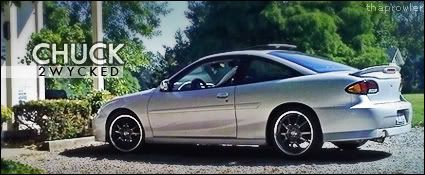Im planning on doing the "Big 3" this weekend, and the only inline fuses the local car stores have is up to 100A. would that be good for 4ga wire, or should i order higher amp fuses online to be safe?
---

i dont knwo whats recomended..but i have a 135a circuit breaker....better than fuses, pm for details

My car may run 18s, but I can do your taxes in 10 seconds flat.
JBO lube - they would never have enough in stock and we'd never see RodimusPrime again
For single wire open air current capacity you need to take into consideration the type wire (insulation) and ambient temperature. 4 awg THHN (what you'd find at Lowe's) is rated at 140 amps at 86F for open air. Anything over 86F will result in a new (lower) current rating based on a correction factor. The same 4 awg THHN wire that could handle 140 amps at 86F can only safely handle 81 amps at 150F before you reach the thermal limits of the insulation.
Taking into consideration the stock alternator only puts out 105 amps, the big three is only supplementary wiring that won't carry all 105 amps, and the underhood temps are greater that 86F I wouldn't go over a 100 amp fuse or circuit breaker. I have a hard time believing you'd blow a 100 amp fuse unless you shorted to ground anyway.

lol no i didnt buy wire from lowes, i bought audio wire from the local custom shop, its fairly thick insulation
---

Chesterton (Chuck) wrote:lol no i didnt buy wire from lowes, i bought audio wire from the local custom shop, its fairly thick insulation
Haha! I was just using that as an example. Thickness of the insulation won't guarantee a higher current capacity, but you should be able to look on the insulation and find the current rating printed on it none the less.

it wont state a curent rating because the longer the wire the less amperage it can carry. a 1' piece of wire will hold allot more current then a 15' of wire. as long as your fusing on your amps isnt over 100 amps. 100 amps will be fine to use. if u can get the fuses go with them ive never been a fan of circuit breakers, they are mechanical and that means it can fail. ive never blown a fuse in 18 years in this hobby.
http://www.flickr.com/photos/sndsgood/ https://www.facebook.com/#!/Square1Photography
well theres only a 40 amp fuse in my amp, but this wire isnt for my amp, its for battery+ to alternator. wich btw i cannot get to the freaking wire on the alternator to save my life with my giant ass hands
---

yeah its just the stock alt. ill put it in this weekend and see what happens. also, anyone have a tip for getting to the alt power wire? i cant get my giant hands in there to pop it off
---

sndsgood wrote:it wont state a curent rating because the longer the wire the less amperage it can carry. a 1' piece of wire will hold allot more current then a 15' of wire. as long as your fusing on your amps isnt over 100 amps. 100 amps will be fine to use. if u can get the fuses go with them ive never been a fan of circuit breakers, they are mechanical and that means it can fail. ive never blown a fuse in 18 years in this hobby.
damnit im trying to make a sale....lol
i jsut want this thing gone....chepa as possible

My car may run 18s, but I can do your taxes in 10 seconds flat.
JBO lube - they would never have enough in stock and we'd never see RodimusPrime again
sndsgood wrote:it wont state a curent rating because the longer the wire the less amperage it can carry. a 1' piece of wire will hold allot more current then a 15' of wire. as long as your fusing on your amps isnt over 100 amps. 100 amps will be fine to use. if u can get the fuses go with them ive never been a fan of circuit breakers, they are mechanical and that means it can fail. ive never blown a fuse in 18 years in this hobby.
The current rating of the wire doesn't change with length, so the fusing isn't length dependent. The total circuit resistance changes with length causing less current to flow, but it doesn't affect the current carrying capacity of the wire.
Labotomi wrote:sndsgood wrote:it wont state a curent rating because the longer the wire the less amperage it can carry. a 1' piece of wire will hold allot more current then a 15' of wire. as long as your fusing on your amps isnt over 100 amps. 100 amps will be fine to use. if u can get the fuses go with them ive never been a fan of circuit breakers, they are mechanical and that means it can fail. ive never blown a fuse in 18 years in this hobby.
The current rating of the wire doesn't change with length, so the fusing isn't length dependent. The total circuit resistance changes with length causing less current to flow, but it doesn't affect the current carrying capacity of the wire.
im always thinking in terms of supplying amps. with a short as run from the bat to alt shouldnt be any loss.
http://www.flickr.com/photos/sndsgood/ https://www.facebook.com/#!/Square1Photography
im running 4 ga w/ a 100 amp fuse and it hasn't blown or melted, along with the fact that the max alt output is 105.
-----------------------------------------------------------------------

-----------------------------------------------------------------------
- Sold my beloved J in April 2010 -
sndsgood wrote:Labotomi wrote:sndsgood wrote:it wont state a curent rating because the longer the wire the less amperage it can carry. a 1' piece of wire will hold allot more current then a 15' of wire. as long as your fusing on your amps isnt over 100 amps. 100 amps will be fine to use. if u can get the fuses go with them ive never been a fan of circuit breakers, they are mechanical and that means it can fail. ive never blown a fuse in 18 years in this hobby.
The current rating of the wire doesn't change with length, so the fusing isn't length dependent. The total circuit resistance changes with length causing less current to flow, but it doesn't affect the current carrying capacity of the wire.
im always thinking in terms of supplying amps. with a short as run from the bat to alt shouldnt be any loss.
Exactly. The wire isn't going to be long enough to worry about voltage drop or resistance. The type of insulation will determine the current rating as the insulation will break down before the wire, but I can't imagine any 4 gauge that can't handle 100-105 amps open air with the short runs used in a big three upgrade.

ohvrolla wrote:sndsgood wrote:Labotomi wrote:sndsgood wrote:it wont state a curent rating because the longer the wire the less amperage it can carry. a 1' piece of wire will hold allot more current then a 15' of wire. as long as your fusing on your amps isnt over 100 amps. 100 amps will be fine to use. if u can get the fuses go with them ive never been a fan of circuit breakers, they are mechanical and that means it can fail. ive never blown a fuse in 18 years in this hobby.
The current rating of the wire doesn't change with length, so the fusing isn't length dependent. The total circuit resistance changes with length causing less current to flow, but it doesn't affect the current carrying capacity of the wire.
im always thinking in terms of supplying amps. with a short as run from the bat to alt shouldnt be any loss.
Exactly. The wire isn't going to be long enough to worry about voltage drop or resistance. The type of insulation will determine the current rating as the insulation will break down before the wire, but I can't imagine any 4 gauge that can't handle 100-105 amps open air with the short runs used in a big three upgrade.
I'll agree with the exception of insulation determining current rating. It will however affect the voltage rating.
^^^^ Insulation does affect current rating. TW (normally used for household) insulated wire will not be rated as high as THHN or THHW especially as you go larger in wire size. I doubt the OP is using these types of wire, but it shows that insulation can play a role in current capacity.

ohvrolla wrote:^^^^ Insulation does affect current rating. TW (normally used for household) insulated wire will not be rated as high as THHN or THHW especially as you go larger in wire size. I doubt the OP is using these types of wire, but it shows that insulation can play a role in current capacity.
You're right. I read your post and thought you implying that the insulation was "the" factor for current rating and didn't want anyone getting the wrong impression. I've seen people change the type of wire just because another would give greater current ratings when they should have upsized the wiring and kept the right kind of insulation for the environment.
Labotomi wrote:ohvrolla wrote:^^^^ Insulation does affect current rating. TW (normally used for household) insulated wire will not be rated as high as THHN or THHW especially as you go larger in wire size. I doubt the OP is using these types of wire, but it shows that insulation can play a role in current capacity.
You're right. I read your post and thought you implying that the insulation was "the" factor for current rating and didn't want anyone getting the wrong impression. I've seen people change the type of wire just because another would give greater current ratings when they should have upsized the wiring and kept the right kind of insulation for the environment.
and people wonder how car audio can get so confusing lol
http://www.flickr.com/photos/sndsgood/ https://www.facebook.com/#!/Square1Photography











